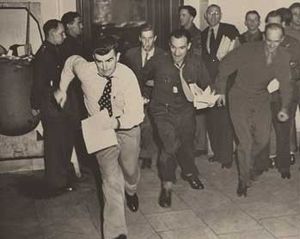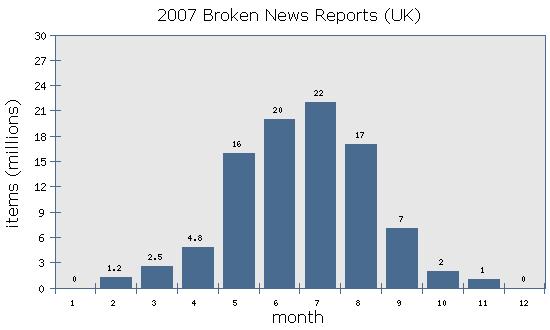UnNews:UNC agrees to replace broken news
16 December 2007
LONDON, United Kingdom - Universal News Corporation announced that they had finally reached an agreement with their UK distributors today to settle a bitter dispute over the delivery of thousands of pieces of broken news items to UK news distributors earlier this year.
In a landmark agreement which will have major implications for the future of the news industry, UNC has agreed to replace or repair all the affected news items but stopped short of offering financial compensation to the affected agencies or to UK businesses affected by the fallout.
At a press conference today, the UNC board read out the following carefully prepared statement and then left without further comment: Following extended discussions between UNC and it’s UK partners, UNC has agreed, as a gesture of goodwill, without admitting liability and in order to best serve our own long-term interests, to repair or replace items of news that our distributors claim were received in a less than satisfactory condition. The items affected were a small number of the many millions we supply daily and were immediately recalled as soon as we realised that the distributors were going public, were considering legal action and had stopped paying us. Having stalled for as long as possible, bringing our distributors to their knees, we are now making the minimum possible offer which we believe to be very generous.
Still reeling[edit | edit source]
A spokesman for the UK news agencies cautioned against considering this as a victory. Many of our members lost their lives as a result of this farce and many more are still reeling from UNC’s complete disregard for their environmental, moral and social responsibilities. They have stuck rigidly to the small print in contracts that we all willingly signed and forced us into accepting a fantastic settlement. We still believe that the offer of financial compensation to those affected is the only way that we will make any easy money out of this.
Insurance still on agenda[edit | edit source]
Industry quango people welcomed the announcement. A spokesman said: News by its very nature is a fragile and limited resource with a short shelf life. Everyone in the industry acknowledges the need for it to be transported swiftly and securely if consumers are to receive the standards of news to which they have become accustomed. Whilst we are pleased with the announcement by UNC today, we believe that there is more that can be done to further reduce the number of news breakages and leaks and to ease the pressure on UK distributors. The issue of compulsory news insurance is still on the agenda and discussions at industry parties will continue.
Distributors squeezed[edit | edit source]
The dispute began in February this year with a sharp rise in the quantity of UNC supplied raw news delivered damaged to the UK. This caused financial difficulties for hard-pressed distributors already squeezed by falling consumer demand and rising insurance costs.
Prior to 2005, UNC raw news carried an unconditional warranty, with news that broke or started leaking in transit being immediately replaced: however, this policy was abandoned in January 2005 as part of a UNC cost-cutting drive (estimated to have saved UNC over £3 billion!) leaving the distributors to cover the cost of any news damaged in transit.
UNC was initially unable to identify the root cause of the problem and the quantities of broken news delivered rose each month, peaking at an estimated 22 million items in July this year when distributors started withholding payment, forcing UNC to take emergency measures to resolve the problem.
Summer of silence[edit | edit source]
The UK regularly ground to a halt in what has become known as "the summer of silence". As the broken news was delivered across radio and television networks, UK citizens stopped in their tracks and stood silently shaking their heads in disbelief. It was estimated at one point that a significant percentage of the UK population was either affected or unaffected by these events.
UK business leaders claimed that the cost to UK businesses was more than £18 billion through lost productivity alone and that it would therefore probably cost UK insurers more than £42 billion in lost productivity claims. UK insurers said they were braced for an avalanche of claims, having received one already and would probably have little option but to pass on at least £68 billion of their costs to UK householders through increased premiums rather than risk making a loss. A senior financial analyst estimated that almost all of this amount would end up on UK credit cards, forcing the UK banks to write off at least £100 billion in bad debts this week alone. A UK business spokesman laughed loudly and punched the air.



